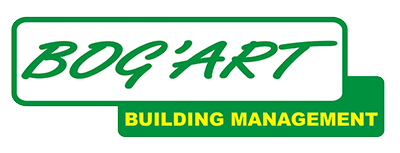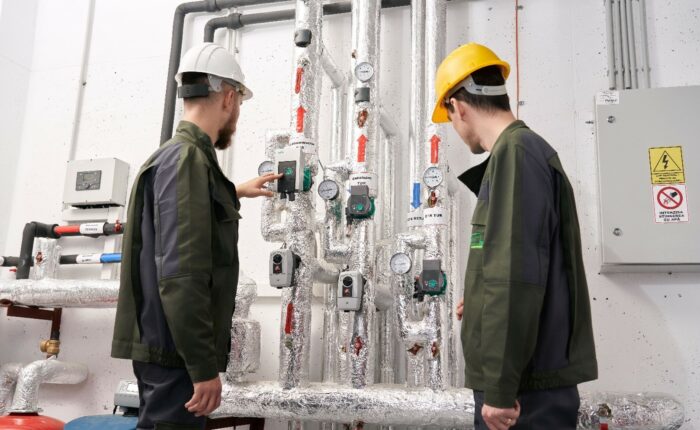The equipment used in buildings, from heating and cooling systems to elevators and electrical and plumbing installations, plays an extremely important role in ensuring the comfort, safety, and efficiency of living and working spaces.
To maintain optimal functionality, reduce the risks of accidents or breakdowns that could affect the safety of residents and property, and to avoid high repair and maintenance costs, regular technical inspections for all equipment and technical systems in operation are recommended.
What are the most important type of technical inspection works and what role do they play in the efficient management of buildings?
1. Heating and Cooling System Inspections
Heating and air conditioning systems require constant checks to prevent gas leaks, carbon monoxide issues, or component malfunctions, ensuring a healthy and safe living environment.
Regular inspections involve the systematic verification and maintenance of heating and cooling equipment in buildings. Key components are carefully examined, filters are cleaned and replaced, the energy efficiency of the equipment is tested, and electrical connections are checked. Such inspections are recommended to be conducted at regular intervals, typically annually, to ensure optimal system performance and extend their lifespan.
2. Electrical Installation Inspections
The safety of occupants in buildings is of utmost importance, and regular inspections of electrical installations are critical to prevent the risks of fire or electrocution.
Regular inspections can identify potential issues such as damaged wiring or faulty equipment, playing a vital role in ensuring that installations comply with current safety standards and regulations. Additionally, these inspections contribute to extending the lifespan of installations and reducing long-term maintenance costs.
3. Plumbing System Inspection
Ensuring hygiene and comfort are particularly important priorities for both residents and property owners. In this regard, regular inspections of plumbing systems are essential to create a healthy environment and prevent potential inconveniences associated with leaks or other malfunctions. These checks allow for the early detection of potential risks, such as corrosion, limescale deposits, or component wear, thereby avoiding extensive damage to plumbing installations.
4. Inspections for Fire Safety Equipment
Buildings must adhere to strict fire safety standards to protect the lives and property of occupants. Regular inspections of fire detection systems, fire extinguishers, and evacuation routes are crucial to ensuring their proper functioning in emergency situations. Additionally, it is important for buildings to be equipped with effective alarm and warning systems so that people can be quickly alerted in case of a fire.
Furthermore, personnel must undergo regular training on evacuation procedures and the use of safety equipment to be able to respond promptly and efficiently in emergency situations.
5. Photovoltaic Panel Inspection
Regular inspections of photovoltaic panels, ranging from checking the integrity of their mounting and fastening systems, inspecting the grounding installation, and measuring the ground socket’s dispersion resistance to thermography of inverters and electrical connection panels, can ensure that all components of the system are functioning correctly. This reduces the possibility of safety hazards and non-compliance penalties.
By performing maintenance regularly, organizations ensure that solar panels operate at maximum efficiency, minimizing energy waste and reducing the carbon footprint. In conclusion, technical inspections of buildings are essential investments in their safety, durability, and energy efficiency. By identifying and addressing issues in the early stages, building owners and managers can avoid significant costs and ensure the comfort and safety of occupants. Furthermore, the planning and implementation of these inspections contribute to maintaining a sustainable and resilient built environment in the face of the challenges of time.
În concluzie reviziile tehnice ale clădirilor sunt investiții esențiale în securitatea, durabilitatea și eficiența energetică a acestora. Prin identificarea și remedierea problemelor în stadiile incipiente, proprietarii și administratorii de clădiri pot evita costuri semnificative și pot asigura confortul și siguranța ocupanților. Mai mult, planificarea și implementarea acestor revizii contribuie la menținerea unui mediu construit sustenabil și rezistent în fața provocărilor timpului.
Bog’Art Building Management, expert în domeniu, oferă servicii specializate de revizii tehnice periodice, fiind partenerul de încredere pentru proprietarii și administratorii de clădiri. Aceste revizii implică examinarea periodică a echipamentelor precum instalații electrice, sisteme HVAC, lifturi, și alte componente esențiale ale clădirilor, scopul principal fiind prevenirea potențialelor defecțiuni, identificarea și remedierea problemelor în stadii incipiente.
Bog’Art Building Management, an expert in the field, provides specialized services for regular technical inspections, serving as a trusted partner for building owners and managers. These inspections involve the periodic examination of equipment such as electrical installations, HVAC systems, elevators, and other essential building components, with the primary goal of preventing potential malfunctions and addressing issues in their early stages.
Submit a request. Fill out the form below, and soon you will be contacted by a Bog’Art Building Management representative to provide additional information about our services.



